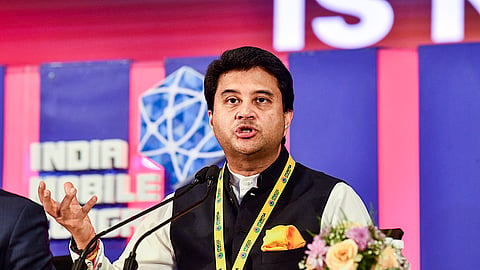Govt, telecom industry face-off over allocation of Satcom spectrum
NEW DELHI: In what looks like a stand-off between the government and the telecom players over allocation of satellite communication (satcom) spectrum, communication minister Jyotiraditya Scindia on Tuesday said the Centre would provide satcom spectrum administratively, not through the auction route.
Scindia, addressing media at the 8th edition of the India Mobile Congress 2024, said if the country were to adopt auction route, it would deviate from global norms. However, he reiterated that this doesn’t imply that satcom players would receive the spectrum free of cost.
The price will be determined by the Telecom Regulatory Authority of India (TRAI). The minister’s statement assumes significance as India’s three major telecom players Reliance Jio, Bharti Airtel, and Vodafone Idea Limited (VIL) favour the auction route.
“The Telecom Act of 2023, passed in December 2024, is focused on Schedule One. This means satcom spectrum will be allocated administratively. This doesn’t mean spectrum will be provided without cost. Cost and the formula for calculating it will not be decided by me or you; it will be determined by TRAI.
I am confident we will arrive at the best pricing mechanism, given that the spectrum is being allocated administratively. Satellite spectrum is allocated administratively worldwide. So, India is not doing anything different,” said Scindia.
Airtel, which was initially in favour of spectrum allocation for satellite communication in India, has changed its stance. Bharti Enterprises chairman Sunil Bharti Mittal on Tuesday advocated for satellite companies to pay licence fees and purchase airwaves for their satellite communication services in the country.
Last week, Jio, India’s largest telco, urged TRAI to revise its consultation paper on satellite spectrum pricing to ensure a level playing field. Currently, there are two players, OneWeb and Jio-SES, that have got the licences for satellite communication in the country. The Elon Musk-led Starlink and Amazon have applied but yet to be approved by the government.
“Those satellite companies who have ambitions to come into urban areas, serving retail customers just need to pay telecom licences like everyone else. They are bound to the same conditions…They need to buy spectrum as telecom companies do, and need to pay for licence as telecom companies do, and also secure networks of telecom companies,” said Mittal.

